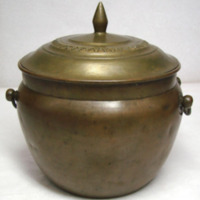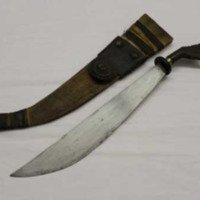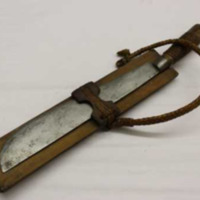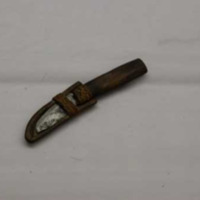Vessel (Moro)
Text
Storage (household effects)
Share this
Media
Images
Map Museum of World Cultures in Frankfurt (Weltkulturen Museum)
Metadata
Date
Between 1900-1904
Identifier
09126
Origin
Moro
Jolo-Insel, Philippines
(The Moros are those natives of the Philippines who are Mohammedans. They did not give themselves this name, nor do they use it among themselves; but they recognize it when applied to them by others. that they called the Mohammedans they found here, Moros. external Islamic rule.)
Jolo-Insel, Philippines
(The Moros are those natives of the Philippines who are Mohammedans. They did not give themselves this name, nor do they use it among themselves; but they recognize it when applied to them by others. that they called the Mohammedans they found here, Moros. external Islamic rule.)
Materials
Brass
Physical Dimensions
Diameter: D. top: 22.8 cm; D. bottom: 16 cm
Object dimensions: H .: 15.2 cm
Object dimensions: H .: 15.2 cm
Provenance
Exchange with the American Museum of Natural History, New York
Acquisition Date
1908
Display status
Not on display
Acknowledgements
Contributed by Yanni R. Hernandez,
Photo: Weltkulturen Museum (Museum of World Cultures) Frankfurt, Germany
Photo: Weltkulturen Museum (Museum of World Cultures) Frankfurt, Germany
Official Website
Collection
Source
Translated from German by MPMC RA's and editors. Record accessed September 2021.
Cite this Page
“Vessel (Moro),” Mapping Philippine Material Culture, accessed April 20, 2024, https://philippinestudies.uk/mapping/items/show/7821.
Geolocation
Sensitive Content
Mapping Philippine Material Culture collates digital material from institutions, and some of this material is inherently colonial and contains words, terms and phrases that are inaccurate, derogatory and harmful towards Filipino and Filipino diasporic communities. Catalogue transcriptions, book titles, exhibition titles and museum titles may contain harmful terms. We recognise the potential for the material to cause physical and mental distress as well as evoke strong emotions. Owing to the scale of the collection’s data, a process to implement sensitive-content warnings in the displayed data is still incomplete. The material within the catalogue does not represent Mapping Philippine Material Culture’s views. Mapping Philippine Material Culture maintains a strong anti-colonial, anti-racist position and affirms its support for centring the humanity of historically marginalised and disenfranchised communities.
Facebook Twitter



